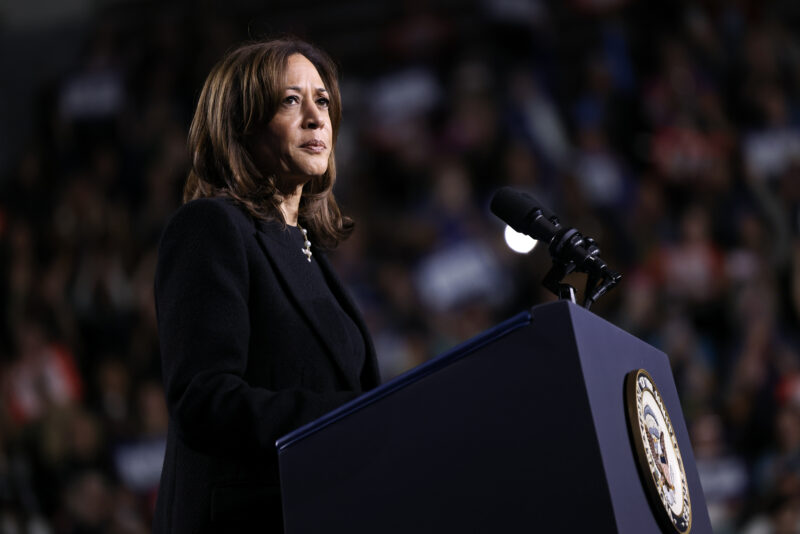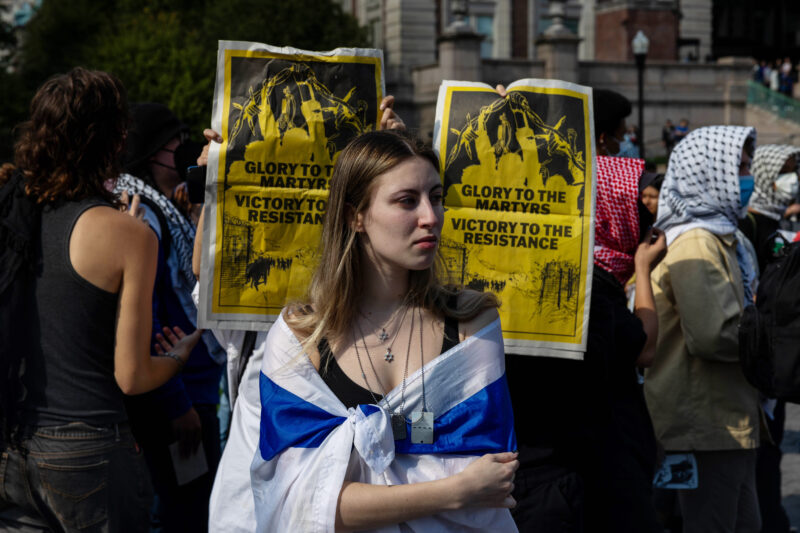Tensions rise on Israel’s northern border as skirmishes with Hezbollah increase
The Israeli army says 203 people are being held hostage by Hamas and other terror groups in Gaza
Amir Levy/Getty Images
Israeli soldiers stand on a tank near the Israeli border with Lebanon on October 18, 2023 in Kachal, Israel.
Tensions continued to rise on Israel’s northern border with Lebanon on Wednesday, with the IDF reporting multiple rounds of artillery fire, anti-tank missiles, and rocket attacks against troops and civilian communities believed to be perpetrated by the Shiite militia group Hezbollah.
Throughout the day Wednesday and overnight, the military said it had identified multiple rocket launches from within Lebanese territory – all of which were intercepted by the army’s ‘Aerial Defense Array,’ including both the Iron Dome and David’s Sling missile-defense systems – as well as rounds of anti-tank fire shot toward the areas of Metula, Malkia and Manara.
Despite fears of sparking a full-scale war on Israel’s northern front as it gears up for an intense ground operation inside Gaza, the military said it has responded to the ongoing Hezbollah attacks by striking targets along the border.
In addition, the army reported that it had thwarted an attempted infiltration of terrorists into Israeli territory. Hezbollah, which is backed by Iran, has said that 10 of its militants have been killed since Hamas’ brutal terrorist attack killing 1,400 people took place on October 7, according to press reports.
In the south, Israeli military jets continued to destroy Hamas’ “terror infrastructure and kill terror operatives” inside Gaza, the army said. Among those killed over the past 24 hours was Rafat Harb Hussein Abu Hilal, head of the military branch of the Popular Resistance Committees in Rafah, and Jamila al-Shanti, a senior member of the terror group’s political bureau. Al-Shanti, according to Israeli media, is the first woman to hold such a position and is considered a senior member of Hamas.
Briefing the U.N. Security Council on Wednesday, Under-Secretary-General for Humanitarian Affairs and Emergency Relief Coordinator Martin Griffiths said the events in the region, both Israel and Gaza, were “the most difficult,” in 75 years.
“We are facing a devastating and clearly difficult challenge for the region and for the international community,” he said. “It comes at a moment when the global institutions we need to respond to such a crisis are already overstretched.”
Griffiths stressed the need for “humanitarian actors to be able to deliver relief to civilians in need throughout Gaza, without impediment.”
Thursday’s daily report by the United Nations Office for the Coordination of Humanitarian Affairs (OCHA) said that the death toll in Gaza had reached 3,471, with Tuesday’s blast at Al Ahli Hospital in Gaza City killing 471.
Using figures based on Hamas’s Ministry of Health in Gaza, OCHA said the attack on the hospital, caused by a misfired Palestinian Islamic Jihad rocket, “was the deadliest incident in Gaza since hostilities escalated.”
“In the wake of this incident,” said OCHA. “The UN Secretary-General has called for ‘an immediate humanitarian ceasefire.’”
During his visit to Israel on Wednesday, President Joe Biden also stressed the need for humanitarian aid to reach Palestinian civilians in Gaza. He told reporters that Israel had agreed to allow a limited amount of aid into the Strip via Egypt, though that aid had still not arrived on Thursday morning as construction was taking place to repair roads destroyed in Israeli air strikes, Reuters reported.
Biden also made clear that the issue of the more than 200 hostages, including as many as 10 U.S. citizens, being held by Palestinian terror groups in Gaza was also a top priority for the U.S.
Following the president’s departure, some of the families of the hostages met with the Israeli government point person dealing with the matter, Gal Hirsh.
Hirsh told the families that Israel would not give up on finding those believed to be in Gaza, saying “We are working 24 hours a day to return all the hostages and missing home, including those who were in Gaza beforehand: Goldin, Shaul, Mengistu, and al-Sayed.”
The bodies of Hadar Goldin and Oron Shaul, both IDF soldiers, were taken by Hamas during the 2014 war in Gaza. Israeli civilians Avera Mengistu and Hisham al-Sayed, who are both believed to be alive, strayed into the enclave in 2014 and 2015 respectively.
“The State of Israel does not give up on anyone and the return of all the kidnapped is an integral part of the war’s objectives,” Hirsch said, according to a statement released by the Hostage and Missing Families Forum.
The retired brigadier general said that Israel was operating on four levels: assessing who is being held hostage, gathering intelligence, providing an address for families’ inquiries and diplomatic efforts in the international arena.
The forum, which represents a large number of the families of those taken hostage during the Oct. 7 terrorist attack, is calling for the immediate creation of a humanitarian corridor that will allow for the transfer of essential medicines to the hostages.
They also called on Hirsh to improve the flow of information from the government level to those who are desperately waiting to hear from their missing relatives.
In the West Bank, the army and other security forces conducted a wide-scale counter-terrorism operation overnight arresting some 80 terror suspects, including 63 from Hamas. In addition, a large number of weapons were confiscated, the army said. Some 524 suspected Palestinian terrorists have been arrested in the West Bank since Oct. 7, more than 330 associated with Hamas.


















































